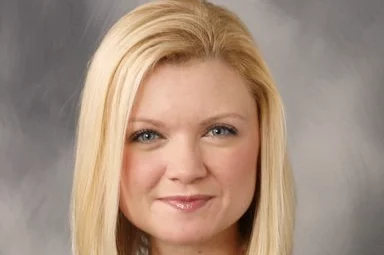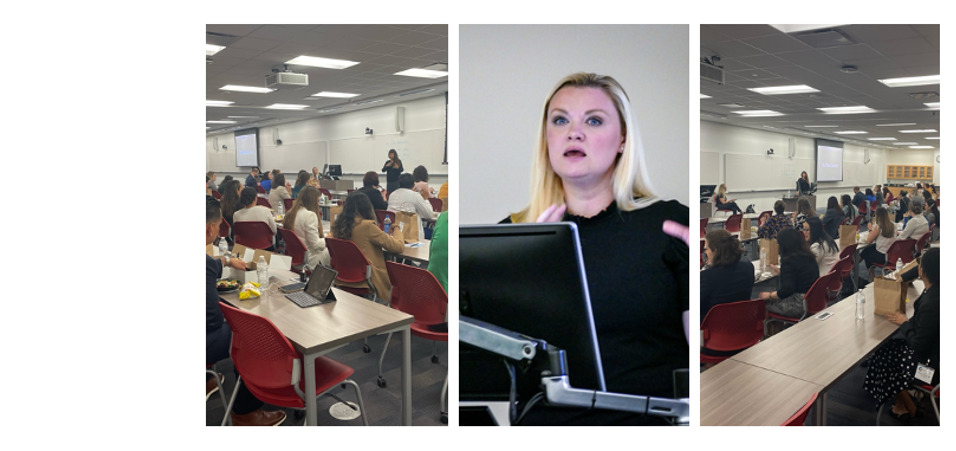
At Penumbra, we believe that unique backgrounds and perspectives result in a more collaborative, innovative, and engaging workplace. In fact, almost 75% of our workforce are people of color, and approximately 50% of our senior leadership team are women. Our initiatives not only focus on advancing diversity within our company, but across the fields in which we work. For example, we recently held a roundtable program, Developing the Next Generation of Women Healthcare Leaders, where we offered a C-suite-level coaching series to physicians that address gender bias and other challenges women physicians encounter in their work.
Inspired by what she learned as a program participant, Dr. Elizabeth Genovese, Director of the Limb Preservation Center and the Medical Co-Director of the Wound Care Center at Medical University of South Carolina, recently partnered with Penumbra to organize a similar coaching experience for attendees at the 2022 Women’s Vascular Summit (WVS) in Buffalo, NY. We sat down with Dr. Genovese to discuss her take on the challenges women physicians face, the importance of leadership programs, and her own leadership journey.

Why did you get into vascular surgery?
Starting in medical school, I knew I wanted to explore a career in a surgical field. As a third-year medical student, I was exposed to Vascular Surgery, and I fell in love with the patient population, medical complexity, and breadth of procedure types. Vascular is an exciting and growing field, booming with new technologies and partnerships. As faculty, I have quickly specialized in treating patients with peripheral arterial disease, particularly those with chronic limb threatening ischemia. This is a medically and surgically challenging patient population, requiring innovative surgical and endovascular interventions that not only facilitates, but requires, multidisciplinary care of the patient to achieve optimal outcomes. It is incredibly fulfilling.
What do you think are the hurdles for women in vascular surgery?
The challenges that women in surgery or other interventional-based fields face are constantly evolving, particularly during the different phases of training. Some hurdles that we have to overcome are universal to the human experience of transitioning to an independent physician and becoming a surgeon, but some are specifically unique to women. As a trainee, you start to feel the inner conflict of finding your voice, being authoritative yet well received, this sense of needing to adhere to societal expectations of gender norms and providing excellent patient care. You quickly realize that men and women are perceived differently in the hospital; and that many people, including your boss, your colleagues, and even your patients, inherently and without any conscious bias, have different expectations of men and women in the surgical field. Women trainees have the potential to be even further scrutinized, “How does she present herself? What was her tone like? What is she wearing? How well liked is she? How is she performing?”
As your career evolves, so do the hurdles. As an attending and junior faculty, it is no longer about surviving as a trainee, but learning how not only to act like a leader, but truly believe you are one as well! It is no longer just about how you are perceived as a female trainee and how well you check the boxes in patient care. The new barriers are, “How, under preconceived gender biases and societal expectations, do you lead your operating room when the people there are used to mostly male surgeons? How do you orchestrate your clinic? How do you take on new administrative challenges and create successful projects?”
As I walk into the operating room, I imagine that I am the coach of a sports team, with all the players highly specialized and vital to the day. As a leader, I have to know what every team member brings to the table and make sure they feel respected in that role. It is also my responsibility to be aware when the feel of the room is off; perhaps one of the team members is having an off day and not performing to their normal standards, maybe the case is not going well. Regardless, I am the person responsible for getting us to the finish line as a cohesive team.
Advice I received early on in my career was to “Imagine you’re mic’d because everyone in the room is always paying attention and listening to what female leaders are saying and doing.” In my experience, this has been universally true, whether it’s in the operating room, teaching rounds, or in the clinic, everyone is watching you. On one hand, this presents a somewhat unfair and unlevel playing field. On the other hand, it is an awesome responsibility and podium you get to stand at every, single day. It’s an opportunity to be an example for generations of medical students and residents, to showcase the compassionate care, dedication to patients, quiet confidence, and humble leadership that strong women bring to the medical and surgical field.
What do you think needs to happen from a leadership or faculty standpoint to help female residents and junior faculty develop that confidence?
There are several approaches that can help foster confidence in rising female leaders. The impact of having women in leadership positions is profound. When you seek mentorship from role models who look like you, who have had the same struggles as you, and who have been successful, it provides validation of your barriers and experience and an inspiration that they can be successfully overcome.
I have been fortunate to have had wonderful male mentors who were compassionate and empathetic towards the unique experiences I had as a female trainee and as a junior faculty. Men in current leadership positions can promote up-and-coming women in the field to break the cycle of the “boys club.” Men who sponsor women have the ability to make swift changes in the composition of the rising leadership of vascular surgery.
Leadership coaching has been invaluable for me. I have spent the past two years understanding how I interact with my team, developing skills to be heard during a critical conversation or when I feel like I don’t belong at the table, and learning how to develop my leadership style and my distinct voice. This is a unique journey for everyone, and it does not happen overnight.
What were your main takeaways from Penumbra’s leadership roundtable that you attended?
The Penumbra leadership course was incredibly comprehensive and multifaceted. I really enjoyed the deeper level of sharing in the small group panel, hearing women who I have admired and watched as trailblazers in the field discuss their own path to leadership in a male-dominated field. I know that I personally see women leaders on committees, councils, and on the podium and think, “How does she do it? She’s a rockstar. She must not have struggled with any of this.” Then, you have the opportunity to participate in a smaller roundtable of successful women including well known vascular surgeons and other prominent interventionalists, and suddenly, you realize that we are all having the same experience. We all feel isolated as the only woman in the room, we all struggle with imposter syndrome, we have difficulty finding our voice and advocating for our promotion. We are not alone in this journey.
I also thought the leadership coach, someone who typically works with C-suite executives at Fortune 500 companies, was incredibly talented and helpful – even in a short period of time. Women executives are walking into board meetings and high-stake situations, they’re showing up, they’re strong, and they’re taken seriously. There’s a lot of value in applying these techniques to the medical field. I personally learned fantastic lessons on how to succinctly communicate my points and how to effectively be heard.
How did the Penumbra Women Leadership Roundtable influence your involvement with the Women’s Vascular Summit (WVS)?
Prior to this year, I had not been involved with the Women’s Vascular Summit on an organizational level. The WVS was originally developed by Dr. Linda Harris and was conducted at the University of Buffalo with an all-star list of women speakers in 2019. I attended it the first year, when it was in person, and it was phenomenal. As a Media Development Committee member with the Eastern Vascular Society (EVS), I had the opportunity to interview Dr. Harris as part of a series on past EVS presidents. While interviewing Dr. Harris, I wanted to ask if I could be a part of the WVS organizing committee, but I didn’t want to overstep or seem overzealous. Finally, after a series of internal, self-affirming statements, I told Dr. Harris that I would love to help with next year’s WVS. I was so nervous about it. I decided to channel my <em>inner man</em> (someone who would just ask or hand over their business card and say, “I’ve sent you my CV already.”). It was out of my comfort zone, and as women we often undervalue our worth and can lack the confidence to promote ourselves. Dr. Harris was delighted about my enthusiasm for the program and invited me to serve on the committee. It was a good lesson for me to learn. Based on my Penumbra roundtable experience, we invited a leadership coach to talk to participants about the issues we’ve been discussing – how to find your voice, how to promote yourself, how to overcome hurdles. I think it was incredibly successful.
What advice do you have for other female vascular surgeons or other women in the medical space?
The biggest piece of advice I can give to women in our field is to genuinely believe in yourself and have confidence that you are in a situation because you earned your right be there. You’re at that table or you’re in that committee, or you’re on that podium because of the hard work that you did. No one gave it to you. You worked for it. You saw it through. Own it. Speak up because you deserve to be a leader.
Related Articles
-
Employee Spotlight: Pascual Reginio
June 26, 2025 -
Penumbra’s Newly Expanded swiftPAC™ Coil Line Poised to Help Physicians Meet Growing Demand for Neurosurgical Conditions
June 20, 2025 -
New THRIVE Data Demonstrates Penumbra’s CAVT™ Technology Is Associated with Reduced Related Readmissions and Complication Rates When Managing ALI
June 6, 2025 -
Employee Spotlight: Maria R. Contreras
May 29, 2025
